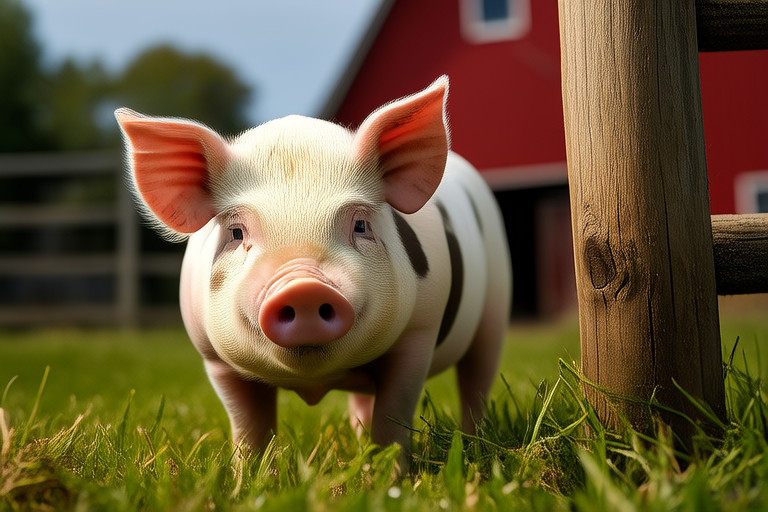From Farm to Home: How to Successfully Adopt a Mini Pig
Welcome to the wonderful world of mini pigs! These intelligent, affectionate, and often surprisingly social creatures can make fantastic companions. However, adopting a mini pig comes with significant responsibilities. This guide will walk you through the process, from understanding their unique needs to preparing your home and beyond.
Understanding Mini Pig Needs
Mini pigs are not just small versions of regular pigs; they have distinct characteristics and requirements that set them apart. They are highly intelligent, capable of problem-solving and learning tricks. Unlike larger breeds, mini pigs are more suitable for indoor living, but they still require ample space to move around comfortably.
One crucial aspect of mini pig care is ensuring they have access to clean, fresh water at all times. Additionally, providing a stimulating environment with toys and activities is essential for their mental well-being. Regular exercise is also vital, as these animals need opportunities to stretch their legs and explore their surroundings.
Choosing the Right Breeder
Selecting the right breeder is one of the most important steps in adopting a mini pig. A reputable breeder will prioritize the health and happiness of their animals, providing proper care and socialization from an early age.
When researching breeders, look for those who offer documentation of vaccinations and health clearances. Responsible breeders will be transparent about the lineage and background of each piglet, ensuring you’re making an informed decision. It’s also advisable to visit the breeding facility if possible, to assess the living conditions and overall welfare of the pigs.
Health Checks
Before bringing your new mini pig home, it’s crucial to schedule a thorough health check with a veterinarian experienced in exotic pets. This initial examination helps identify any underlying health issues and ensures your pet is up-to-date on necessary vaccinations.
Deworming and spaying or neutering should also be considered as part of the health routine. Spaying or neutering can prevent certain behavioral issues and reduce the risk of specific health problems later in life.
Preparing Your Home
Creating a safe and comfortable living space for your mini pig is essential. Start by setting up a designated area within your home where your pig can relax and feel secure. This space should include a comfortable bed, toys, and items that stimulate their curiosity.
Ensure that all areas of your home are pig-proofed, especially if you plan to allow your mini pig some freedom outside its designated space. Remove or secure any objects that could be harmful if chewed or knocked over. Providing access to a fenced outdoor area can also enrich their environment while allowing them to enjoy some fresh air.
Training Tips
Training your mini pig can be both rewarding and challenging. Patience and consistency are key when teaching commands and boundaries. Positive reinforcement techniques, such as offering treats and praise for good behavior, work best.
Start by establishing basic commands like ‘sit,’ ‘stay,’ and ‘come.’ Use short, simple commands and reward your pig immediately after they comply. Avoid harsh punishments, as they can lead to fear and aggression. Instead, focus on building trust and mutual respect between you and your pet.
Diet Considerations
Feeding your mini pig a balanced diet is crucial for their health and longevity. A high-quality commercial pig feed formulated for mini pigs is generally recommended. Look for feeds that are low in fat and calories but rich in vitamins and minerals.
Supplement their diet with fresh vegetables and fruits, avoiding those that are high in sugar or acidic. Always consult with a veterinarian before introducing new foods to ensure they are appropriate for your mini pig’s dietary needs. Fresh water should always be available, and feeding schedules should be consistent to maintain a healthy weight.
Common Myths About Mini Pigs
There are several misconceptions surrounding mini pigs that can influence potential adopters’ decisions. One common myth is that mini pigs remain small throughout their lives. In reality, mini pigs can reach weights ranging from 50 to 150 pounds, depending on their breed and genetics.
Another misconception is that mini pigs are low-maintenance pets. While they may be smaller than standard pigs, they still require daily attention, proper nutrition, and a stimulating environment. Understanding these truths can help set realistic expectations and ensure you’re prepared for the commitment.
The Rewards of Adoption
Adopting a mini pig can bring immense joy and companionship into your life. Their intelligence, loyalty, and unique personalities make them wonderful pets. However, it’s important to approach adoption with a clear understanding of the responsibilities involved.
By providing love, care, and a nurturing environment, you can create a strong bond with your mini pig. The rewards of their companionship far outweigh the challenges, making the experience incredibly fulfilling for both you and your new family member.
Remember, adopting a mini pig is a long-term commitment that requires dedication and effort. With the right preparation and mindset, you can ensure a happy and healthy life for your new pet. Happy adopting!
